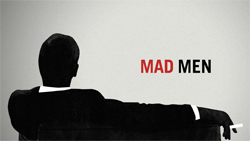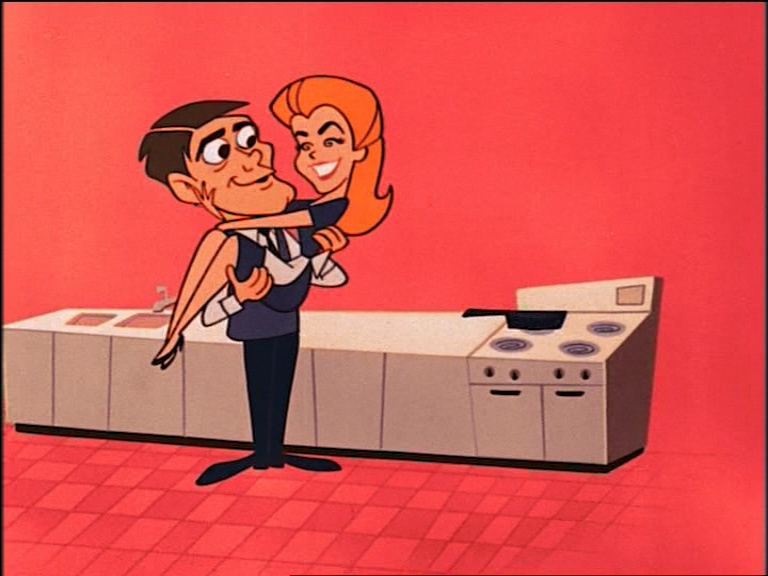
Mad Men became a sensation five years ago with its first season. Whoever watches it, even now, is captivated by its setting, its style, its story, its acting ... it all fit together. But with this season, something’s missing. Is it the writing?
 |
| Mad Men really captured the attitudes of the early 60s. |
What made Mad Men work from the beginning was the writing. Meticulously researched, the writing reinvigorated the ideas, the slang, the concerns of 1960s New York. Creator and writer Matthew Weiner, who was the head writer for The Sopranos, was rightfully lauded for his authentic recreation of the advertising business in 1960.
I have loved the show since. If I don’t watch it Sunday night, it’s on my PVR for the next day. But the latest season doesn’t meet the same standard. It’s almost as if the writers have lost their passion for the show. Or perhaps now that they’ve reached the mid-60s, the feeling about the time is different. It’s now in the height of the flower power era, the era that baby-boomers like to think changed the world, the era where they made their stamp.
In contrast, the early 60s was like a continuation of the 50s. Men wore grey or blue suits and ONLY white shirts. Everyone who wanted to be taken seriously wore a hat. And women competed to see who could have the highest hair. The USA dominated the world in every aspect, and no one
 questioned whether any of that was right or wrong.
questioned whether any of that was right or wrong.The series reminded me of my grandfather and his things: his fedoras, his narrow ties, square-faced watches and big, long cars—all things that seemed so hopelessly old-fashioned by the late 60s and early 70s. Now, I think that’s all so cool. When I have to wear a tie these days, it’s skinny.
What’s wrong
 Why do I think something’s off in the writing room?
Why do I think something’s off in the writing room? New characters just don’t seem believable. The show has taken a lot of flack from the Internet over the character of Michael Ginsberg, who comes across as “too Jewish.” The real problem is that he’s a cliché, a caricature: nervous, nerdy, short, whiny ... it’s just too easy, compared to, say, Joan or Peggy or the most complex character in all of television, Don Draper himself.
Then there’s Megan Draper, Don’s new, young, French Canadian wife.
I don’t think I’ve ever seen a less French-Canadian character on television. I at first doubted whether the actor was French, but a little research proved that, indeed, Jessica Paré IS French-Canadian. She’s even a little like her character, Megan: her father, Anthony Paré, is a professor at McGill and her mother, Louise Mercier, is a translator.
So why doesn’t she ring true? Well, there’s the name, for a start: no French-Canadian intellectual of the Quiet Revolution generation would name his daughter Megan. Yes, there was a trend in the 60s where French people gave their boys very English- or Irish-sounding names. There are many French men and women of my generation in Quebec with names like Patrick, Douglas or Edward. (I haven’t personally met any women with English-sounding names, come to think of it.)

The episode that aired a week ago brought Megan’s parents from Montreal: a university professor trying to publish a book and his wife. Again, something was off. The actors’ accents weren’t right (and I know: I have a lot of French-Canadian relatives). Again, they’re flat, stereotypes — but stereotypes of the wrong category. The dialog was forced, completely unlike the usual quick flow I've come to expect from Mad Men.
Mad Men is in danger of veering down the worn-out Hollywood paths with predictable stories, cartoonish characters and complete misrepresentation of reality. It’s too bad, because the show began as almost an expose of a reality that most people preferred not to recognize.

Hi... I love the show too. But I agree and I think you may be onto something about stereotypes. The characters in the earlier seasons were good because their many sides were developed subtly giving them depth. Maybe the newer characters just need more time to evolve. Although it's called Mad Men, I really think it's more about the women and their changes during the volatile 60's of which I was a part.
ReplyDeleteScott, I havent seen the lastest episodes of Mad Men, but I do agree with you in what you say what an outstanding show it was when it came on our screens and that era, the clothes, cars etc was an period I would have loved to been part of...
ReplyDeleteAnyway, another great post and now following.....
I had the same reaction concerning Megan's accent. It's not French-Canadian, although a friend says she let out a "tabernacle" at some point in the show. On the other hand if they had used an authentic Québecois accent we'd have been rolling in the floor over here in France.
ReplyDelete